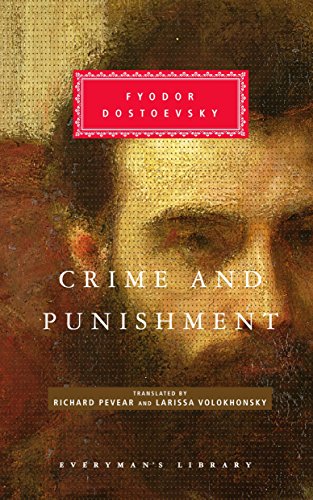All Categories


Crime and Punishment (Everyman's Library)
Share Tweet
Get it between 2024-05-13 to 2024-05-20. Additional 3 business days for provincial shipping.
*Price and Stocks may change without prior notice
*Packaging of actual item may differ from photo shown
- Electrical items MAY be 110 volts.
- 7 Day Return Policy
- All products are genuine and original
- Cash On Delivery/Cash Upon Pickup Available








Crime and Punishment Features
-
Used Book in Good Condition
About Crime And Punishment
Review “The best [translation of Crime and Punishment] currently available…An especially faithful re-creation…with a coiled-spring kinetic energy…Don’t miss it.” –Washington Post Book World “This fresh, new translation…provides a more exact, idiomatic, and contemporary rendition of the novel that brings Fyodor Dostoevsky’s tale achingly alive…It succeeds beautifully.” –San Francisco Chronicle “Reaches as close to Dostoevsky’s Russian as is possible in English…The original’s force and frightening immediacy is captured…The Pevear and Volokhonsky translation will become the standard English version.”–Chicago Tribune Product Description Raskolnikov, an impoverished student living in the St. Petersburg of the tsars, is determined to overreach his humanity and assert his untrammeled individual will. When he commits an act of murder and theft, he sets into motion a story that, for its excruciating suspense, its atmospheric vividness, and its depth of characterization and vision is almost unequaled in the literatures of the world. The best known of Dostoevsky’s masterpieces, Crime and Punishment can bear any amount of rereading without losing a drop of its power over our imaginations. Dostoevsky’s drama of sin, guilt, and redemption transforms the sordid story of an old woman’s murder into the nineteenth century’s profoundest and most compelling philosophical novel. Award-winning translators Richard Pevear and Larissa Volokhonsky render this elusive and wildly innovative novel with an energy, suppleness, and range of voice that do full justice to the genius of its creator. Amazon.com Review Mired in poverty, the student Raskolnikov nevertheless thinks well of himself. Of his pawnbroker he takes a different view, and in deciding to do away with her he sets in motion his own tragic downfall. Dostoyevsky's penetrating novel of an intellectual whose moral compass goes haywire, and the detective who hunts him down for his terrible crime, is a stunning psychological portrait, a thriller and a profound meditation on guilt and retribution. From the Inside Flap Introduction by W. J. Leatherbarrow; Translation by Richard Pevear and Larissa Volokhonsky From the Back Cover Determined to overreach his humanity and assert his untrammelled individual will, Raskolnikov, and impoverished student living in the St. Petersburg of the Tsars, commits an act of murder and theft and sets into motion a story which, for its excruciating suspense, its atmospheric vividness, and its profundity of characterization and vision, is almost unequaled in the literatures of the world. The best known of Dostoevsky's masterpieces, Crime And Punishment can bear any amount of rereading without losing a drop of its power over our imagination. About the Author Fyodor Mikailovich Dostoevsky’s life was as dark and dramatic as the great novels he wrote. He was born in Moscow in 1821. A short first novel, Poor Folk (1846) brought him instant success, but his writing career was cut short by his arrest for alleged subversion against Tsar Nicholas I in 1849. In prison he was given the “silent treatment” for eight months (guards even wore velvet soled boots) before he was led in front a firing squad. Dressed in a death shroud, he faced an open grave and awaited execution, when suddenly, an order arrived commuting his sentence. He then spent four years at hard labor in a Siberian prison, where he began to suffer from epilepsy, and he returned to St. Petersburg only a full ten years after he had left in chains. His prison experiences coupled with his conversion to a profoundly religious philosophy formed the basis for his great novels. But it was his fortuitous marriage to Anna Snitkina, following a period of utter destitution brought about by his compulsive gambling, that gave Dostoevsky the emotional stability to complete Crime and Punishment (1866), The Idiot (1868-69), The Possessed (1871-72),and The Brothers Karamazov (1879-80). When Dostoevsky died in 1881, he l


















